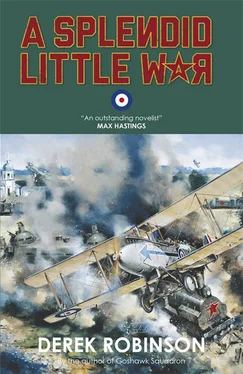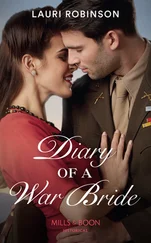As they formed up, the train reversed and slowly vanished into the crowd. Wragge realized that he had completely forgotten about Chef and the engine crew. Well, they had whatever food was left in The Dregs, which was something. Where would they go? Nowhere good.
The squadron marched through the wretched crowd. It watched them go, silently and sullenly. They went down some harbour steps and into a boat. Nobody in the boat looked back as it bucketed across the bay. Everyone looked at the British cruiser waiting for them. It was big and clean-cut and reassuringly safe.
The cruiser sailed two hours later. Oliphant and Brazier stood at the rail, watching Novo fade away. “Well, Uncle, that was an utter shambles,” Oliphant said. “I can’t see that we did the slightest bit of good to anyone. If anything, we just helped to make a total balls-up of their whole stupid war.”
“There’s a useful lesson to be learned,” Brazier said. “Interfere in someone else’s family quarrel and you’ll always end up with a bloody nose. And you’ll get no thanks.”
“I’ll try to remember that, Uncle.”
“Nobody else will, Tusker. The interfering will go on. And so will the bloody noses. You watch.”
4
It was raining in London; had been raining all day. Outside 10 Downing Street the policemen’s capes shone like polished lead. Lloyd George was in Geneva, lucky chap, putting in an appearance at talks about the League of Nations. Jonathan Fitzroy took the opportunity to hold a small sherry party at Number 10. It was an occasion to convey the P.M.’s gratitude to the Sub-Committee on Russia. Former Sub-Committee. It had ceased to be, through force of circumstances. But Fitzroy had a tidy mind, and a word of thanks cost nothing.
“Never knew such a summer,” Sir Franklyn said; “I felt sorry for the county cricketers. Season’s been a washout.”
“ The Times says there are floods in America,” Fitzroy said. “Of course, there are always floods somewhere in America.”
“One place you don’t want to be is Russia,” General Stattaford said. “Freezing snow from now until spring.” Silence. Nobody wanted to talk about Russian weather. “All our troops got out before winter,” he said. “British Army knows how to extricate its men. Point of pride.”
“Not all,” Charles Delahaye said.
“Brace yourselves,” Weatherby said. “The Treasury is going to bombard us with statistics.”
“And money,” Delahaye said. “Widows’ pensions, for example. Maintenance of military cemeteries. The Army left 526 men buried in North Russia alone. I can give you the figures for the other campaigns, the Caspian area for instance, and the men we sent to aid Denikin, and the Siberian wars…”
“Some other time, perhaps,” Fitzroy said.
“Then there’s the Royal Navy,” Delahaye said. “The Treasury takes a keen interest in sailors. Warships are costly to replace.”
“Undoubtedly,” Fitzroy said. “But we reviewed that very carefully, didn’t we? The Kronstadt affair, Lieutenant Agar V.C., splendid stuff. We lost a few motor boats, am I right?”
“Not entirely. By July of 1919 the Royal Navy had an average of eighty-eight warships and auxiliaries in the Baltic, at no little cost. They lost seventeen ships, including a cruiser, two destroyers and a submarine. Thirty-five officers and 128 men were killed.”
“What’s your point?” Stattaford said, sharply.
“Simply that our Intervention in the internal affairs of another nation came at a price.”
“We were never publicly at war,” Sir Franklyn said. “Now we are very publicly at peace with the Soviets. Lloyd George deserves a little credit for his secrecy.”
“Denikin might have won,” Stattaford said stubbornly.
“So what?” Weatherby said. “The Kaiser might have won. That’s not what the history books will say, is it?”
“Gentlemen, gentlemen,” Fitzroy said. “Please. Let us not bicker. The matter is over and done with. General, let me give you more sherry.”
There was silence while he topped up their glasses.
“Now we have nothing to talk about,” Weatherby said. “Except the bloody awful weather, and we’ve done that.”
“Perhaps the matter is not yet quite finished,” Sir Franklyn said. “Who will write the Official History of the Intervention?” He looked hard at Fitzroy. “Surely the question has arisen.”
“I’m not at liberty to say.”
“And is that because you don’t know, or because you’ve been told to stonewall?”
Fitzroy spread his hands. “I’m not at liberty to say that either.” They laughed, except for Sir Franklyn, who gave a wintry smile.
“There won’t be an Official History, will there?” he said. “You needn’t answer that. You already have.”
Weatherby looked at his watch. “I have a train to catch.”
Delahaye shared a taxi with him. General Stattaford chose to walk.
Fitzroy was helping Sir Franklyn into his greatcoat, and finding his umbrella, when Sir Franklyn said: “Just imagine that Russia, France, America, Czechoslovakia, Japan, and a few more — Canadians, Serbs, Chinese — imagine that they all sent armed forces into Britain at different points, in order to decide our form of government. Can you imagine that?”
“Scarcely.”
“And if they did what I’ve said, and if we defeated them, how long would it take the British people to forget this?”
“Oh… generations. Perhaps never.”
“Just a thought. Goodnight, Mr Fitzroy.” He put on his hat, stepped outside and opened his umbrella, and walked into the night.
Every record of Merlin Squadron’s operations in Russia was burnt when the British Military Mission left Taganrog. All of Lacey’s signals, including his exchanges with Captain Butcher about elephant guns and with Captain Stokes about jazz-band instruments, were lost. He kept copies of his fabricated verse eulogies, thinking that they might, one day, be useful for his memoirs.
The squadron disembarked the cruiser at Portsmouth. Most of the ground crew, with their valuable skills, stayed in the R.A.F. Brazier returned to his old regiment, soon grew dissatisfied with peacetime soldiering, and applied for a posting to Palestine, which was now a British Protectorate. He became expert at leading small groups of soldiers in night-time raids on Arab terrorists. In 1935 he was shot dead in one such raid, and was awarded a posthumous Bar to his Military Cross.
Tusker Oliphant left the R.A.F. and worked as a flying instructor at a civil aerodrome. His patience and his calm authority made him popular with students. For many years he organized an annual reunion of members of Merlin Squadron.
Tiger Wragge was offered a job as an R.A.F. test pilot, and took it, on the understanding that he would be free to fly in international air races. His successes in these events won him some public fame. In 1931 he was testing the prototype of a new fighter aircraft when it disintegrated at low level and he was killed.
Junk Jessop left the service and sold Ford cars in London. Later he grew a moustache in the style made fashionable by Douglas Fairbanks Jr (he slightly resembled the actor) and moved up to selling Bentleys. His ghosted memoirs of the Russian war were a minor success, but when the Special Branch questioned him about a breach of the Official Secrets Act he moved to Australia.
The R.A.F. had no use for Borodin, and Susan Perry made it clear that they could never be more than friends. She went back to nursing at Guy’s Hospital and let him stay in her flat until he found a job. Within weeks he married an American film actress who was in London recovering from a divorce. He went with her to Hollywood. When she divorced him he made a career in movies, playing supporting roles as a suave but dangerous Englishman. Susan Perry qualified as a doctor, married a farmer and never regretted it.
Читать дальше











